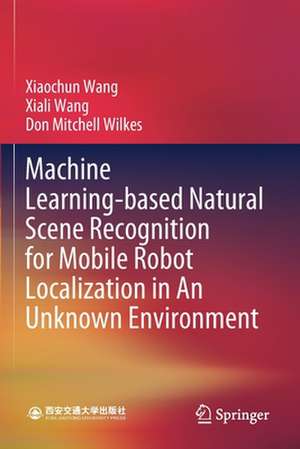Machine Learning-based Natural Scene Recognition for Mobile Robot Localization in An Unknown Environment
Autor Xiaochun Wang, Xiali Wang, Don Mitchell Wilkesen Limba Engleză Paperback – 25 aug 2020
| Toate formatele și edițiile | Preț | Express |
|---|---|---|
| Paperback (1) | 643.16 lei 6-8 săpt. | |
| Springer Nature Singapore – 25 aug 2020 | 643.16 lei 6-8 săpt. | |
| Hardback (1) | 898.75 lei 6-8 săpt. | |
| Springer Nature Singapore – 24 aug 2019 | 898.75 lei 6-8 săpt. |
Preț: 643.16 lei
Preț vechi: 756.65 lei
-15% Nou
Puncte Express: 965
Preț estimativ în valută:
123.08€ • 127.77$ • 102.63£
123.08€ • 127.77$ • 102.63£
Carte tipărită la comandă
Livrare economică 22 martie-05 aprilie
Preluare comenzi: 021 569.72.76
Specificații
ISBN-13: 9789811392191
ISBN-10: 9811392196
Pagini: 328
Ilustrații: XXII, 328 p. 99 illus., 78 illus. in color.
Dimensiuni: 155 x 235 mm
Greutate: 0.49 kg
Ediția:1st ed. 2020
Editura: Springer Nature Singapore
Colecția Springer
Locul publicării:Singapore, Singapore
ISBN-10: 9811392196
Pagini: 328
Ilustrații: XXII, 328 p. 99 illus., 78 illus. in color.
Dimensiuni: 155 x 235 mm
Greutate: 0.49 kg
Ediția:1st ed. 2020
Editura: Springer Nature Singapore
Colecția Springer
Locul publicării:Singapore, Singapore
Cuprins
Part I Introduction.- Part II Unsupervised Learning.- Part III Supervised Learning and Semi-Supervised Learning.- Part IV Reinforcement Learning.
Notă biografică
Xiaochun Wang received her BS degree from Beijing University and the PhD degree from the Department of Electrical Engineering and Computer Science, Vanderbilt University. She is currently an associate professor of School of Software Engineering at Xi’an Jiaotong University. Her research interests are in computer vision, signal processing, and pattern recognition.
Xia Li Wang received the PhD degree from the Department of Computer Science, Northwest University, China, in 2005. He is a faculty member in the Department of Computer Science, Changan University, China. His research interests are in computer vision, signal processing, intelligent traffic system, and pattern recognition.
D. Mitchell Wilkes received the BSEE degree from Florida Atlantic, and the MSEE and PhD degrees from Georgia Institute of Technology. His research interests include digital signal processing, image processing and computer vision, structurally adaptive systems, sonar,as well as signal modeling. He is a member of the IEEE and a faculty member at the Department of Electrical Engineering and Computer Science, Vanderbilt University. He is a member of the IEEE.
Textul de pe ultima copertă
This book advances research on mobile robot localization in unknown environments by focusing on machine-learning-based natural scene recognition. The respective chapters highlight the latest developments in vision-based machine perception and machine learning research for localization applications, and cover such topics as: image-segmentation-based visual perceptual grouping for the efficient identification of objects composing unknown environments; classification-based rapid object recognition for the semantic analysis of natural scenes in unknown environments; the present understanding of the Prefrontal Cortex working memory mechanism and its biological processes for human-like localization; and the application of this present understanding to improve mobile robot localization. The book also features a perspective on bridging the gap between feature representations and decision-making using reinforcement learning, laying the groundwork for future advances in mobile robot navigation research.
Caracteristici
Focuses on building bridges between natural and artificial computation Presents an object identification model and two different strategies for online learning Evaluates using a realistic scenario and delivers convincing results
